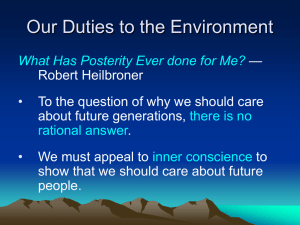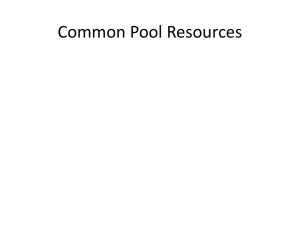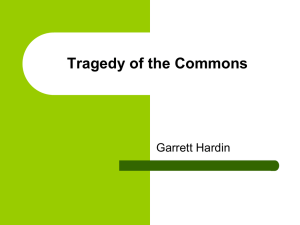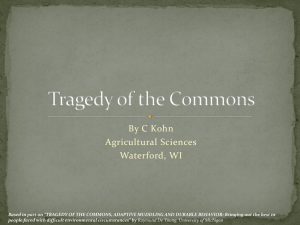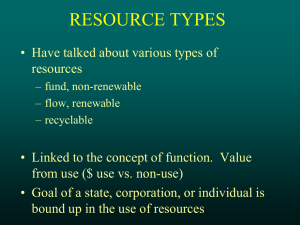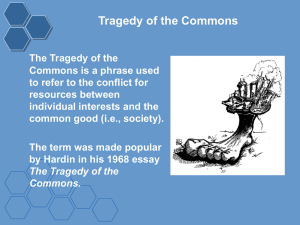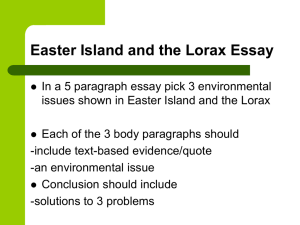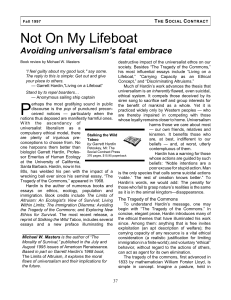Hardin Summary - Herrick Chang
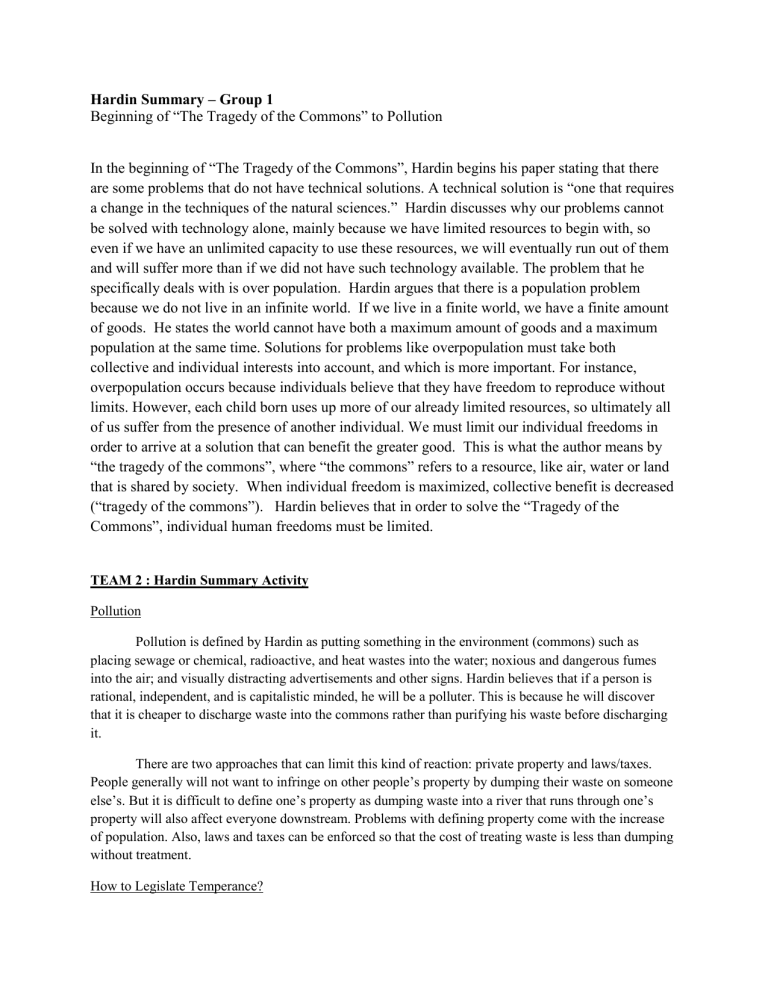
Hardin Summary – Group 1
Beginning of “The Tragedy of the Commons” to Pollution
In the beginning of “The Tragedy of the Commons”, Hardin begins his paper stating that there are some problems that do not have technical solutions. A technical solution is “one that requires a change in the techniques of the natural sciences.” Hardin discusses why our problems cannot be solved with technology alone, mainly because we have limited resources to begin with, so even if we have an unlimited capacity to use these resources, we will eventually run out of them and will suffer more than if we did not have such technology available. The problem that he specifically deals with is over population. Hardin argues that there is a population problem because we do not live in an infinite world. If we live in a finite world, we have a finite amount of goods. He states the world cannot have both a maximum amount of goods and a maximum population at the same time. Solutions for problems like overpopulation must take both collective and individual interests into account, and which is more important. For instance, overpopulation occurs because individuals believe that they have freedom to reproduce without limits. However, each child born uses up more of our already limited resources, so ultimately all of us suffer from the presence of another individual. We must limit our individual freedoms in order to arrive at a solution that can benefit the greater good. This is what the author means by
“the tragedy of the commons”, where “the commons” refers to a resource, like air, water or land that is shared by society. When individual freedom is maximized, collective benefit is decreased
(“tragedy of the commons”). Hardin believes that in order to solve the “Tragedy of the
Commons”, individual human freedoms must be limited.
TEAM 2 : Hardin Summary Activity
Pollution
Pollution is defined by Hardin as putting something in the environment (commons) such as placing sewage or chemical, radioactive, and heat wastes into the water; noxious and dangerous fumes into the air; and visually distracting advertisements and other signs. Hardin believes that if a person is rational, independent, and is capitalistic minded, he will be a polluter. This is because he will discover that it is cheaper to discharge waste into the commons rather than purifying his waste before discharging it.
There are two approaches that can limit this kind of reaction: private property and laws/taxes.
People generally will not want to infringe on other people’s property by dumping their waste on someone else’s. But it is difficult to define one’s property as dumping waste into a river that runs through one’s property will also affect everyone downstream. Problems with defining property come with the increase of population. Also, laws and taxes can be enforced so that the cost of treating waste is less than dumping without treatment.
How to Legislate Temperance?
“The morality of an act is a function of the state of the system at the time it is performed.” The time period determines when an act is moral or not.
Ex.: Killing a bison and only eating a part of it & discarding the rest = OK in frontier times
= NOT OK in current society
Morality is also system sensitive since it is impossible to determine the scale in which it is okay to safely burn trash in the back yard or what safe emission standards on cars are. Most laws of our society follow the patterns of ancient ethics (ex. Thou shall not….) and are unsuited for governing a complex, crowded, ever changing world.
The current solution is augment statutory law with administrative law. Because some problems, such as smog emissions, are hard to establish standards/boundaries for, by law we delegate the problem to bureaus. The result is administrative law, but is vulnerable to corruption. This is because Bureau administrators are trying to evaluate the morality of acts in the total system creating a “government by men, not laws.”
How do we legislate temperance (moderation)? Consider the problem of alcohol. Instead of complete prohibition, set an allowable level of consumption. This will also serve as a reminder of potential dangers that we can’t avoid.
Freedom to Breed is Intolerable
The United Nations declared that it is the right of the family to decide its size. Generally, the size of the family depends on whether the family can adequately care for itself. But society is committed to a welfare state, which encourages over breeding as a source of increasing a nation’s wealth and power. This contributes to the problem of overpopulation.
Team 3: From Conscience is Self-Eliminating up to (but not including) Mutual Coercion
Mutually Agreed Upon.
Hardin asserts that making an appeal to conscience will not be effective in restricting breeding simply because people are different, a notion previously stated by C. G. Darwin. Those who do not respond to the plea will bear a greater majority of the population than those who do respond. This gap will only grow larger with each passing generation. In saying that different people have different level of desire for children, Hardin makes the assumption that this desire is hereditary. Therefore, the gap of those people who want to bear more children and those who don’t will increase since this attitude of desire is passed down to more and more people.
Ultimately, humans will become overpopulated. Hardin further applies this hereditary concept to exploitation of all commons.
The short-term disadvantage to an appeal to conscience (as an effort to halt exploitation of commons) sends contradictory messages to a citizen. On the one hand, the citizen is explicitly told to obey orders or face condemnation, but on the other, the citizen is implicitly made to feel condemned if orders are followed. It goes against the individual’s self-interest to use fewer resources while less conscientious individuals choose to squander resources. Hardin describes
dealing with the contradictory communications as a “double bind,” which has negative effects on mental health. He quotes Nietzsche, who stated that having a bad conscience is a kind of an illness. Harding warns that while the double bind can be used to make someone guilty and pursue them to perform an action that they would not normally do, using guilt as a method of manipulation is not as valuable as it used to be in the pre-Freudian era. He goes on to assert that modern thought suggests that nothing positive has ever been achieved by guilt. People who feel guilty tend to only be concerned about their own personal fears and anxieties. These fears and concerns often have several negative effects, but never have any positive effects. The Dark Ages, for example, took place because of the anxieties and fears that education had created.
The concept of responsibility is no different than an appeal to conscience. Therefore, for the same reasons, an appeal to responsibility should be used no more than an appeal to conscience. When the word responsibility is used without coercion we are forcing people to act against their own will. As Hardin says, “[responsibility is] an attempt to get something for nothing.” Instead, if we choose to use the word responsibility, we should use it in the sense of
“social arrangements.”
Group 4
Hardin argues that appealing to conscience leads to double minded decisions and should be avoided as people vary and have different perceptions. Adopting planning as far as parenthood is concerned and mutually agreed upon responsibilities by critical thinking is the solution to the problem.
The solution to the problem lies in mutually agreed upon social arrangements creating coercion. “The only kind of coercion I recommend is mutual coercion, mutually agreed upon by the majority of the people affected” (Hardin,1968).
Although some harmful actions can be discourage by moral values, there exist some actions that have to be banned specifically by law. For example, bank robbing, is such action that has to be prohibited by law. Many actions need to be enforced by mutual coercion. For example, taxes. If we allow people to pay taxes voluntarily, it will benefit the people that have no shame of not contributing to the society (i.e. those of who don’t pay taxes). Hardin also criticizes that the legal inheritance of private property is unjust. However, if we don’t have this system, the society will be in a total chaos. Therefore, it’s better to be unjust rather than total chaos.
In conclusion, the article reinforces the idea of population growth as a huge problem that has lead to abandoning various commons including food gathering, place for the waste disposal, pollution of advertising, pollution by automobiles, factories etc. The abandoning of the commons is still not applied throughout the world and is a conflicting issue. The notion of freedom is being misused as it has brought universal ruin, abandoning recognition of commons leading to tragedy. “I believe it was Hegel who said,
Freedom is the recognition of necessity. The most important aspect of the necessity that we must now recognize is the necessity of abandoning the commons in breeding” (Hardin,1968). According to Hardin,
there is no technical solution to the problem at all and requires critical thinking plus recognition of the problem through the same eyes. Overpopulation will bring ruin to all and to end this aspect of tragedy of the commons repercussions are need to be taken into consideration by extending morality. Education can definitely play a role especially in the impoverished areas where population is growing at a high rate.
There are some administrative laws and regulations that need to be modified keeping current context into consideration. Truth needs to be confronted by everyone. Honest and responsible policies can help in resolving the tragedy.
